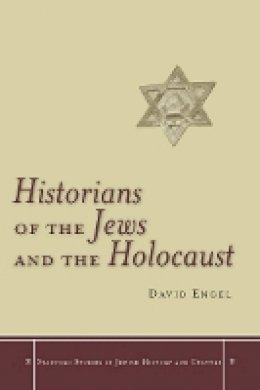David Engel is Greenberg Professor of Holocaust Studies, Professor of Hebrew and Judaic Studies, and Professor of History at New York University.
"The book must be deemed a well-argued and impressive appeal for Jewish scholars—whose work Engel clearly admires—to step out of the shadows of the current perpetrator-dominated Holocaust debate and to show how the catastrophe can be fitted into Jewish historical development, thereby creating a more complete picture of Jewish history as a whole. Above all, Engel's book shows that historiographical thinking is often as important and thought-provoking as original scholarship and it is vital in providing the insights and questions about the current state of new thinking on the discipline that can lead on to further detailed empirical research."—Frank McDonough, European History Quarterly "In this provocative book, David Engel tries to understand why most historians of the Jews have refused to let the Holocaust influence the way they see the Jewish past. Historians who study modern European Jewish history, Engel claims, "sequester the Holocaust," seeing it as a separate field unto itself or as a branch of European history but not as a phenomenon with roots in the history of Jewish-Gentile interactions in Europe."—Marsha L Rozenblit, Journal of Modern History "This Jewish professor predicts that overemphasis on the Holocaust martyrdom will eventually fade . . . [and suggests that] in Israel, 'the Holocaust' has become less an historical story, and more like a novelist's moral tale."—Robert H. Whealey, Canadian Journal of History "David Engel's excellent book challenges scholars to reconsider the relationship between the Holocaust and modern Jewish history, two fields deliberately sequestered from one another by modern Jewish historians . . . Engel's is an important and provocative work that explains why the Holocaust has been the preserve of historians of Europe rather than historians of the Jews. It further points to the intellectual consequences of this development. It ought to be read and considered by anyone working in these areas."—Norman J. W. Goda, Journal of Central European History "David Engel . . . provides us in Historians of the Jews and the Holocaust with a brilliant 'historiographic study of the tendency of historians of Holocaust...and historians of the Jews...to construct their fields as two separate realms, each wit its own rules and practices, whose border is not readily crossed."—CJR, Jewish Book World "Engel uncovers the intellectual and sociological roots of a longstanding partition between Jewish history and Holocaust Studies and argues persuasively for its removal. This is an extremely important work that ought to provoke all modern Jewish historians to reflect on the assumptions governing their own work and their approach to the matters they study." —Allan Arkush, SUNY Binghamton

